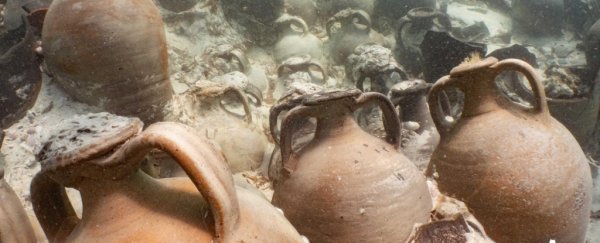Archaeologists have recovered a rare and tantalising treasure off the coast of Mallorca in Spain. Not gold or jewels, but 93 jug-like terracotta vessels called amphorae from a Roman ship that sank 1,700 years ago.
Most of these beautiful jugs are still intact and sealed, which means there's a very good chance their contents were preserved, too.
The shipwreck was found just 50 metres (164 feet) from the shore, after local resident Felix Alarcón spotted pottery shards on the seafloor in July.
Because it was so close to the popular Playa de Palma beach resort and the tourist town of Can Pastilla, the Spanish government enlisted the Balearic Institute of Maritime Archaeology Studies (IBEAM) for an emergency excavation.
Their work revealed a relatively small seafaring vessel, just 10 metres (33 feet) long and 5 metres (16 feet) wide, with the amphorae carefully stowed in the hold. It was likely a merchant ship, transporting goods between the Iberian Peninsula and Rome; Mallorca is en route between the two.
Because so many of the jugs were undamaged, archaeologists believe that whatever sank the boat wasn't a turbulent shipwreck caused by bad weather. The two leading hypotheses are that the ship somehow sprung a leak; or perhaps a violent clash between humans on-board resulted in the ship's demise.
It's possible we'll never know. The amphorae, on the other hand, should reveal what the vessel was transporting.
Archaeologists believe, based on the regions from which the amphorae appear to have originated, the contents were probably foodstuffs - things like wine, olive oil, and a type of fermented fish sauce called garum from Lusitania that was particularly prized in Rome.
Before the amphorae can be unsealed however, they need to be carefully treated. They are currently at the Museum of Mallorca, where they are in pools of water to be desalinated.
"This process is important because the salt crystallises and can break the amphorae," Mallorca council heritage director Kika Coll told Central European News.
"The amphorae have spent 1,700 years underwater and we do not want to make mistakes. Once we are able to translate the inscriptions, we will learn more about the merchants, the products they transported and where they came from."
The archaeologists expect to be able to announce their findings within a few months, so watch this space.
Meanwhile, the shipwreck itself is to remain on the seafloor where it sank, as a monument to history.
